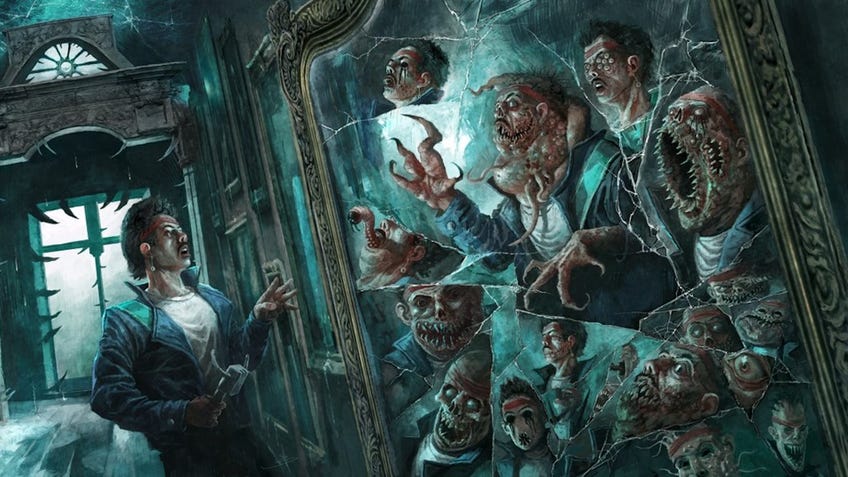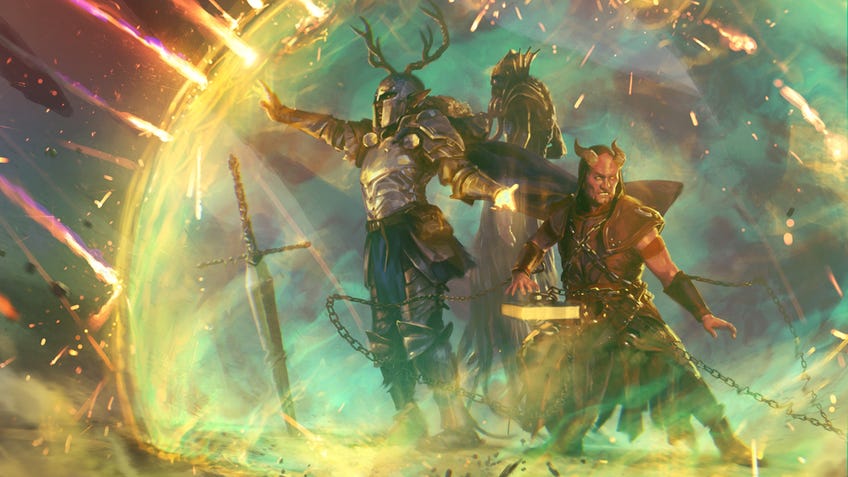Magic: The Gathering’s head designer says new Play Boosters will "save" TCG's Draft and Limited formats
“If we didn't do anything, draft boosters were going away. This whole change was to save drafting.”
Magic: The Gathering players are feeling the ground shift beneath their feet after the popular trading card game revealed plans to meld their two existing booster packs into the single Play Booster. Comments from head designer Mark Rosewater now paints the decision as a somewhat dire rescue mission for the desiccated limited formats.
Rosewater, a longtime public face for Wizards of the Coast and prolific online commenter, replied to a Twitter user who expressed concern over the forecasted increasing price of limited formats such as draft and sealed. Studio X, which is responsible for managing the physical side of MTG, discovered that Set Boosters were so popular that they effectively pushed Draft Boosters out of nearly every market. When pushed to choose between purchasing one of the two available boosters, a recent article argues, hobby stores chose surefire sales over fostering a local scene.
“If we didn't do anything, draft boosters were going away. This whole change was to save drafting (and other limited formats),” Rosewater wrote on Twitter.
The community responded immediately on social media, astounded over the implication that a pillar of Magic: The Gathering that has existed since Richard Garfield created it nearly 30 years ago might suddenly pine for the fjord. While some called it a “wild statement”, others pointed out that draft players compose the minority purchasers of Hasbro’s first billion-dollar brand - why would they be the primary focus for product decisions.
Whatever weakness set boosters exposed in Magic: The Gathering’s organised play was further exacerbated by the COVID-19 pandemic. Wizards of the Coast pivoted its marketing and pushed online drafting via MTG Arena - it remains one of the most popular and lucrative parts of the TCG’s multimedia machine. Traditional events at brick & mortar stores have struggled to recover amidst rising costs, product fatigue, and economic conditions that make an already expensive hobby less feasible. It’s not hard to imagine how close limited formats and draft boosters were from the edge of the metaphorical cliff.
Rosewater tweeted a clarification on October 16th somewhat backtracking the tenor of his original assertion: “To clarify something I said earlier today. We do a lot of future forecasting. Had trends continued the way they were going, we believed the draft booster were [sic] in danger of going away due to market forces. No one in Wizards/Hasbro was trying to get rid of limited play,” he said.

It’s easy to forget that the differing booster packs are little more than three years old, releasing in 2020 and creating a welcome avenue for players who enjoyed MTG for its collectibility, art and special treatments instead of a thoughtfully designed experience. Dedicated support for Commander via preconstructed decks, Universes Beyond tie-ins and even full card sets such as Commander Masters, are a relatively recent phenomenon. Wizards of the Coast has invested major resources into the flashy parts of its entertainment empire and reaped the rewards while limited formats sat mouldering in the garden.
The knock-on effects of these decisions have left the limited and Standard formats languishing on the vine and players are understandably looking for answers. We don’t know that Hasbro executives held the metaphorical sword of Damocles above the head of draft boosters, forcing designers to act in defense - Dicebreaker has reached out for comment. Rosewater’s blaming “market forces” does sound disingenuous and more than a little vague, but there’s little evidence pointing at a callous, greedy plot by Hasbro - no more than a for-profit corporation with Vanguard as its top shareholder normally employs.
Play Boosters seem to be a gambit to avoid the possible future where draft only exists online and hobby stores an intermediary vendor for MTG the collectible, not the interactive game with three decades of design baked into its weird, wonderful bones. Asking players to swallow an increased cost on top of the uncertainty this would-be saviour brings is cold comfort.

